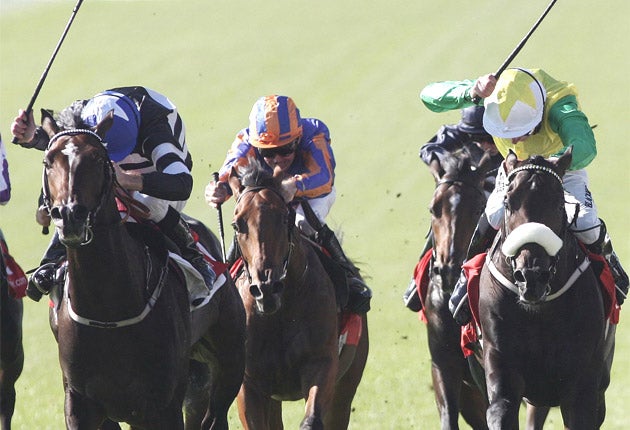Buyers spare the whip at Keeneland
Recession bites in the bloodstock market as prices of yearlings tumble

Though he has felt obliged to scold Wall Street for its renewed complacency, President Obama has little need to counsel austerity elsewhere in the union. The September Yearling Sale at Keeneland has long been a key barometer for the global bloodstock market. And 12 months after Lehman Brothers discovered that no bank was too big to fail, the business of buying and selling racehorses registered not so much an aftershock, as a fresh convulsion.
Gross revenue on Monday plunged 55.5 per cent from the opening session last year; the average fell 35.9 per cent, and the median from $300,000 (£187,500) to $200,000. For the first time since 1996, no horse changed hands for $1m. Last year, there were five, including one for $3.1m. Moreover the ratio of horses failing to reach their reserve soared to four in 10.
The director of sales at Keeneland, Geoffrey Russell, sought to restore sobriety to these dazing figures. "Readjustments are never easy, and we are in the middle of a major readjustment," he reasoned. "No mistake, the pendulum has swung to the buyer side; they are more hesitant and careful in their bidding."
Others were less circumspect. As Satish Sanan, one of the biggest players in the market, told the American trade magazine Blood Horse: "It's brutal. People put a lot of money into stud fees two years ago, and the market is disastrous. This is going to get a lot worse before it gets better."
The tremors will certainly be felt at Coolmore, perhaps the most powerful commercial stud in Turf history. But John Magnier and his partners none the less earned the distinction of taking home the top lot, a colt by Unbridled's Song for $925,000. He is a half-brother to the champion filly, Ashado, and as such Demi O'Byrne, who signed the chit, suggested he might have got a bargain. With his dirt pedigree, however, the colt may yet remain in the United States, rather than come over to be trained at Ballydoyle.
A filly by Giant's Causeway, who stands on Coolmore's Kentucky farm, was decorated with the next highest price of $800,000. But it was the identity of her other parent – the 2002 horse of the year, Azeri – that best measured the difference a year makes. Last year, incredibly, Azeri's first foal was bought in by her vendors for $7.7m.
Last month, the elite sale at Saratoga recorded some remarkably buoyant returns, but there was always the possibility of some unique impetus following a takeover by associates of Sheikh Mohammed. Not that he was especially reticent at Keeneland, predictably ending the session as its biggest spender. John Ferguson, his bloodstock manager, paid $4.83m for 14 yearlings. Last year, he had been obliged to spend $8.825m for just nine.
Ferguson emphasised the positives in the environment, remarking that it was now fertile for new investors. And the reality is that some correction was overdue in a market that perennially depends on the self-fulfilling "values" of commercial breeding – rather than the prize money available on the racecourse itself. Equally, one of the defining purposes of championship races has always been to identify the best conduits for the improvement of the gene pool.
On that basis, the Darley Dewhurst Stakes is one of the most precious races in Europe – and Jim Bolger, one of the most influential trainers. He has won the past three runnings, and yesterday James Kelly, racing manager to Lady O'Reilly, confirmed that Bolger is training her colt, Chabal, for Newmarket on 17 October. The Galileo colt finished strongly for second in the National Stakes at the Curragh last Saturday – a remarkable effort just eight days after his debut.
"We were over the moon with him," Kelly said. "He was green early and if there was a stronger pace there was no doubt he would have won. He'll get a stronger pace in the Dewhurst, and Newmarket will also suit our horse better, as will fast ground."
Kelly remembered visiting Bolger with Lady O'Reilly back in April. "When you go into his house, there are three trophies on the left – the last three Dewhursts," he said. "Jim said to us at that stage: 'I'll have a fourth one there this year.' So we hope he is right."
Turf account: Chris McGrath
Nap
Zaplamation (5.20 Beverley) A runaway winner on his first start for John Quinn, he has twice finished runner-up since, set plenty to do on each occasion. He split two subsequent winners at Musselburgh last time, and the same rating just enables him to squeeze into lesser company here.
Next best
Captain Flasheart (1.40 Yarmouth) Smoothly landed a gamble in an apprentice handicap at Kempton last week and escapes a penalty here. The drop to 7f could prompt improvement.
One to watch
Cheetah (L.M. Cumani) has a very stout pedigree and showed ample on her debut at Ffos Las on Sunday to promise much over middle distances.
Where the money's going
Northern Alliance is 13-2 favourite with Ladbrokes for the Guinness Kerry National at Listowel today – with Ponmeoath 12-1.
Join our commenting forum
Join thought-provoking conversations, follow other Independent readers and see their replies
Comments
Bookmark popover
Removed from bookmarks